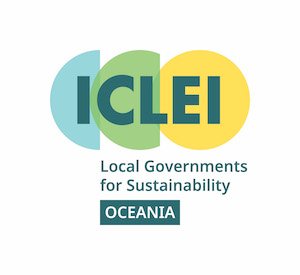Building resilience in Kiribati: How the ICLEI Blue Green Development Project empowers vulnerable communities
Churches tackling climate change in Kiribati
The Blue-Green Development in Kiribati project, funded by the German Government through its International Climate Initiative (IKI), is helping vulnerable communities across the small atoll islands of South Tarawa, Kiribati, combat the escalating impacts of climate change. These islands face degraded soils, saline groundwater, frequent tidal flooding, and extreme weather, putting them on the frontlines of environmental vulnerability. The project focuses on two urban councils, Teinainano Urban Council (TUC) and Betio Town Council (BTC), implementing innovative techniques to enhance food security, waste management, and long-term resilience.
In BTC, the project team engaged with five church-based communities selected by the Council. Through interactive workshops, participants explored how climate change is already reshaping life on Betio and what the future holds.
Betio, a densely populated island of nearly 20,000 residents, is confined to less than 2 square kilometres. Many inhabitants have relocated from outer islands, straining limited resources. By 2050, rising sea levels are expected to submerge large portions of the island. Already, locals struggle to source food through traditional means such as home gardens, tree crops, and fishing. Reliance on expensive, low-nutrition imported goods has become the norm, exacerbating food insecurity.
Women and elders leading the way
Notably, four out of five participating church groups consisted almost entirely of women and elders, including church leaders, female heads of households, and long-time or newly arrived residents. Recognizing their pivotal role, the project has prioritized training in 2025, equipping communities with sustainable farming methods such as: above-ground cultivation of fruits and vegetables, soil enrichment using mulch and biochar, experimentation with resilient plant varieties, expansion of chicken and pig husbandry, and the utilization of seaweed for both mulch and food.
These techniques aim not only to improve household nutrition but also to generate surplus produce for sale, creating income opportunities for women while reducing dependence on imports.
The project also builds on lessons from the Covid-19 pandemic, which exposed Kiribati’s vulnerability to global supply chain disruptions. By fostering local food production, the initiative strengthens community self-sufficiency and prepares residents for future crises.
Strengthening traditional governance through innovation
A unique aspect of the project is its integration with Kiribati’s traditional Maneaba leadership system. While most islands rely on male-dominated Maneaba councils, Betio’s community governance is centred around churches. Workshops were held in church Maneaba buildings, which are open-walled meeting spaces central to communal decision-making.
The project seeks to:
Empower local leaders, particularly women, within this structure
Demonstrate the effectiveness of grassroots climate action
Advocate for multi-level governance (MLG), where national policies support community-driven solutions
Key takeaways from the project:
Women participants have emerged as dynamic leaders, driving initiatives with creativity and determination.
While church elders are predominantly male, strong partnerships with women leaders are forming, promising long-term benefits beyond the project.
Many community members struggle to perceive climate change due to its gradual effects. By combining scientific projections with residents’ lived experiences, the project fosters a clearer understanding of future risks, especially among women who manage households, food security, and family well-being.
A model for the future
The Blue-Green Development in Kiribati project highlights the power of community-driven adaptation. By blending traditional knowledge with innovative practices, it offers a replicable blueprint for resilience in at-risk island nations, one that prioritises inclusivity, sustainability, and local leadership.
Written by: Steve Gawler







